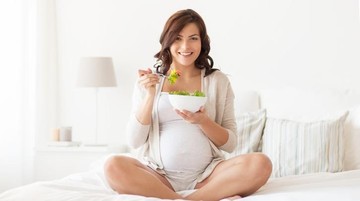
Pregnancy making your cravings go crazy? But The dishes that you love make you feel nauseated? Are you worried too about the health of your baby and you’re not sure what to eat?
You’re probably hearing a lot about it that it’s important to eat healthy food while being pregnant. We’re here to make a one-stop shop of nutritious and tasty foods for your pantry that will give your child the best start to life. You would want to concentrate on whole foods while building your balanced eating plan, which will give you higher concentrations of the good things you would need when not pregnant.
Here are few super healthy foods to consume to help ensure that you meet your nutrient targets when you are pregnant.
- Beans and Lentils: During pregnancy, all women need 10 extra grams of protein per day (for a total of at least 60 grams); beans and lentils are an excellent source, with approximately 15 grams per cup. They are high in fiber, too, which helps fight constipation.
- Broccoli and Green Leafy Vegetables: Broccoli and dark, green vegetables, including spinach and kale, pack so much of the nutrients you’re going to need. They can also be squirrelled into all sorts of dishes, in case you do not enjoy eating them. Fiber, vitamin C, vitamin K, vitamin A, calcium, iron, folate, and potassium are among the benefits. They’re a bonanza of goodness.
- Berries: In their small packets of water, healthy carbs, vitamin C, fiber, and antioxidants, berries contain a lot of goodness. There are relatively low glycemic index levels for berries, so they do not cause significant blood sugar spikes. Berries are also be a perfect snack, since both water and fiber contain them. They have a great deal of nutrition and flavor, but with very few calories.
- Dry Fruit: In general, dried fruit is high in calories, fiber, and various minerals and vitamins. Only without all the water and in a much smaller shape, one piece of dried fruit contains the same amount of nutrients as fresh fruit. A significant percentage of the daily intake of several vitamins and minerals, including folate, iron, and potassium, can be provided with one serving of dried fruit. Dates are rich in compounds of fiber, potassium, iron, and plants. Dried fruit, however, also contains high concentrations of natural sugar. Make sure the candied varieties that produce even more sugar are avoided. While dried fruit may help increase the intake of calories and nutrients, eating more than one serving at a time is generally not recommended.
- Bananas: Bananas are high in potassium and provide fast energy to combat exhaustion during pregnancy. It’s easy on your stomach, too, if you have nausea.
- Lean Meat and Proteins: Excellent sources of high-quality protein are lean pork and chicken. Pork is also rich in iron, choline and other B vitamins, all of which you would need during pregnancy in higher quantities. Iron is an important mineral which, as part of haemoglobin, is used by red blood cells. Since your blood volume is rising, you’ll need more iron. During your third trimester, this is highly pertinent. Low levels of iron can cause iron deficiency anaemia during early and mid-pregnancy, which raises the risk of low birth weight and other complications.
- Avocado: As they contain a lot of monounsaturated fatty acids, avocados are an uncommon fruit. This makes them taste rich and buttery, perfect for a dish to add depth and creaminess. They also contain high amounts of fiber, B vitamins (folate in particular), vitamin K, potassium, copper, vitamin E, and vitamin C. Avocados are a great option during pregnancy due to their high content of good fats, folate, and potassium. Healthy fats help construct your little one’s skin, brain, and tissues, and folate can help prevent neural tube defects, brain and spine developmental disorders such as spina bifida.



